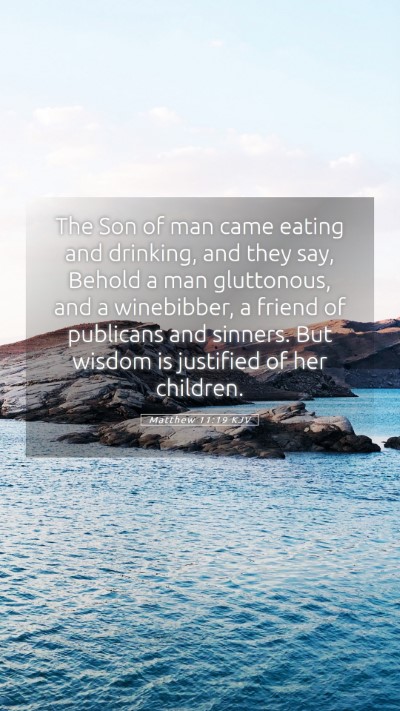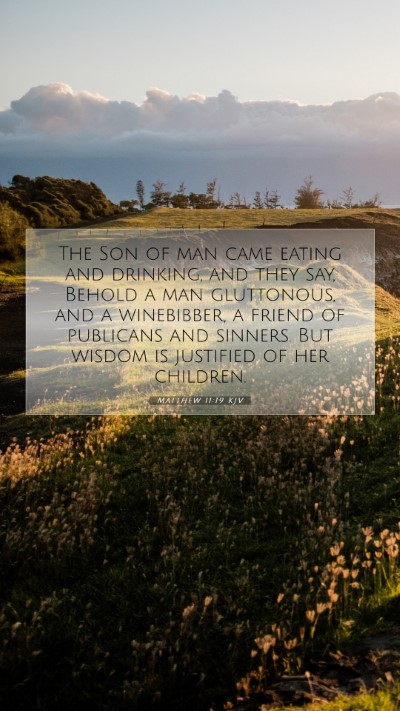Understanding Matthew 11:19: A Comprehensive Commentary
Verse: Matthew 11:19 - "The Son of Man came eating and drinking, and they say, ‘Look at him! A glutton and a drunkard, a friend of tax collectors and sinners!’ Yet wisdom is justified by her deeds.”
This verse provides rich insight into the ministry of Jesus Christ and highlights the reactions of the people towards Him. The reactions reflect the complexities in understanding the character and mission of Jesus. Below is a detailed exploration of Matthew 11:19 based on public domain commentaries.
Setting the Scene
The context of Matthew 11:19 situates Jesus amidst a society steeped in traditional expectations of the Messiah. The expectations were that the Messiah would come in grandeur, establishing a kingdom that aligned with the religious norms of the time.
Jesus' Approach: Eating and Drinking
Eating and Drinking: Matthew Henry notes that Jesus embraced the common social practices of His day. His choice to eat and drink with others highlights His willingness to engage with all strata of society, including those marginalized or despised by the religious elite.
Albert Barnes emphasizes the significance of "eating and drinking" as not just mere social activities, but as expressions of Jesus' approachability and the inclusive nature of His ministry. This was counter to the ascetic expectations often associated with holy figures.
The Accusations: A Glutton and a Drunkard
The terms "glutton" and "drunkard" are powerful accusations. Adam Clarke elaborates on the historical context, suggesting that these labels reflect a misunderstanding of Jesus' mission. Instead of aligning with the religious elite, He chose association with those considered sinful, thereby exposing the hypocrisy of societal norms.
Commentary Insight: Henry points out that these labels were used to discredit Jesus, revealing the prejudices of the time. The Pharisees and other religious leaders couldn't reconcile Jesus' behaviors with their rigid expectations, leading to their derogatory assessments.
Friend of Sinners
The title "friend of tax collectors and sinners" is both a point of derision and an affirmation of Jesus' mission. It highlights a radical acceptance at the heart of His teaching. Barnes notes that this association with society's outcasts was revolutionary and showed God's grace available to all, regardless of status or past actions.
The Conclusion: Wisdom Justified by Deeds
The concluding phrase, "Yet wisdom is justified by her deeds," encapsulates the core message of the passage. Henry remarks that the fruits of Jesus’ ministry and the lives transformed through His message are the true evidence of His divine wisdom and authority.
This phrase challenges the societal norms which questioned Jesus' behaviors and instead invites an examination of the outcomes. The transformation in the lives of those He touched, the healings, and the forgiveness He extended serve as the true measure of wisdom and validity of His ministry.
Cross References
- Luke 7:34 - "The Son of Man has come eating and drinking; and you say, ‘Look at him, a glutton and a drunkard, a friend of tax collectors and sinners!’"
- Mark 2:15-17 - The calling of Levi and eating with sinners.
- Matthew 9:10-13 - Jesus' interaction with sinners and His emphasis on mercy rather than sacrifice.
Application for Today
Understanding and Application: The verse compels us to reflect on how we view those who don't fit within our expectations or community norms. Jesus' example challenges contemporary readers to embrace a spirit of inclusiveness and to recognize that divine wisdom often operates outside of human conventions.
In Bible Study Groups: This verse serves as a powerful illustration for discussions on grace, acceptance, and the nature of Jesus’ ministry. Engaging with this verse can deepen understanding of Jesus' character and mission, making it ideal for online and traditional Bible study settings.
Conclusion
Matthew 11:19 is a pivotal verse that encapsulates the essence of Jesus’ mission and challenges societal expectations. The insights provided by public domain commentaries reveal layers of meaning, inviting deeper exploration and understanding. Whether examining difficult Bible passages or considering the implications for daily life, this verse continues to resonate with significant biblical truths.
By engaging with this scripture through serious biblical exegesis and analysis, believers can extract profound meanings that align with the primary goal of understanding Scripture and applying its truths in everyday life.


